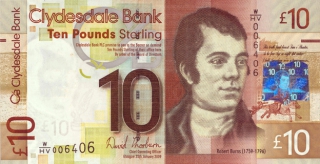Why we don’t want to join the Euro…
The Euro zone is that part of the European Union (established in 1993) that has a common currency the Euro (€). Presently their are 17 countries who are members of the Euro zone and 10 which are not (see below for a list of the countries).
Scotland is presently part of the United Kingdom which has the monetary unit known and the pound (£) or sterling (or pound sterling). The currency (paper money and coins) are issued under the authority of the Bank of England (not called the Bank of the United Kingdom or even the Bank of Britain). However, a quirk of history allows Scottish banks to issue their own paper money (but not coins). Scottish banknotes circulate widely in the United Kingdom (although in some places they are rare and some people are therefore a bit suspicious of them) but because they are not issued by the Bank of England (which is the Bank of the United Kingdom despite the (inaccurate) title) they are therefor not legal tender in a precise legal definition.
When a country joins the Euro zone it gives up the right to have it’s own currency but issues Euro notes and coins with the country’s name on them together with other things appropriate to that country. My desire for the UK not to join the Euro zone has nothing to do with monetary policy, economics or politics. It stems directly from my interest in the history and culture of Scotland. Scotland is part of the UK so on joining the Euro it would be bound by the rules for issuing the Euro currency which does not allow for constituent parts of a country to has their own Euro notes. For example Bavaria, part of Germany, cannot and does not have its own Euro coins and notes. So, although I doubt many would deny that Scotland is a nation, Scottish banks would not be allowed to retain the right to issue their own banknotes.
Apart from Scottish banknotes disappearing on joining the Euro, Scots would also loose a daily visual reminder of its past, its history and its famous people.
- Belgium
- Germany
- Estonia
- Ireland
- Greece
- Spain
- France
- Italy
- Cyprus
- Luxembourg
- Malta
- The Netherlands
- Austria
- Portugal
- Slovenia
- Slovakia
- Finland
Non-participants in the Euro zone are: Bulgaria, Czech Republic, Denmark, Latvia, Lithuania, Hungary, Poland, Romania, Sweden and the United Kingdom. Although they are EU Member States they do not presently use the single European currency.
Posted in Uncategorized
